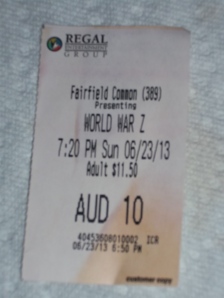 I have to be honest with you–I have a thing for zombies. I think our current fascination with zombies reveals a good bit about our culture. Zombies are the perfect monsters for our age. They maintain a residue of humanity, which makes them recognizable and relatable, though they are inhuman enough for us to enjoy their destruction. Zombies terrorize us because we see much of ourselves within them except for what it is that makes them monstrous–their insatiable desire for human flesh. In short, I was, probably more than most respectable citizens, looking forward to this film.
I have to be honest with you–I have a thing for zombies. I think our current fascination with zombies reveals a good bit about our culture. Zombies are the perfect monsters for our age. They maintain a residue of humanity, which makes them recognizable and relatable, though they are inhuman enough for us to enjoy their destruction. Zombies terrorize us because we see much of ourselves within them except for what it is that makes them monstrous–their insatiable desire for human flesh. In short, I was, probably more than most respectable citizens, looking forward to this film.
World War Z is mostly the story of Gerry Lane (Brad Pitt), a United Nations investigator who is trying to unravel the cause of the zombie apocalypse and, hopefully, turn back the undead tide. Lane’s family (grounded by Mereille Enos, who plays Karin Lane) provides emotional weight to the film, the first portion of which is about their initial escape, while most of the rest occurs with them apart. Gerry Lane hopscotches to South Korea, Israel, and Wales in his quest for answers. Along the way, he picks up Segen (Daniella Kertesz), a soldier with mettle to match her medals.
Zombies, in modern parlance, come in two flavors–the slow, shambling kind that frighten through their numbers, especially in confined spaces (think Night of the Living Dead or Shaun of the Dead) and the rage monsters that are astonishingly strong and fast and pounce on humans like a cheetah on an antelope (think 28 Days Later). World War Z chooses the latter. This helps the tension, and it explains the near civilizational collapse we witness as Zed gets the upper-hand.
As opposed to most zombie films, that excel at mood and gore, director Marc Forester’s effort shines during set action pieces. These include the Lane family’s dash toward safety, a sprint away from a river of zombies in Jerusalem, and a suffocating trip into a laboratory staffed by brain-munchers. But the plot is so thin that only the plane rides appear to bind the scenes together.
Foster attempts to look at the zombie uprising from a global perspective, and this makes World War Z a bit unusual for the genre. Zombie films, even if they portray a global outbreak, tend to focus on a small segment–a house, a town, or a shopping mall. Here, Lane’s travels make it clear that all corners of the globe are struggling, and mostly losing, against the outbreak. Instead of mining these diverse scenes for interesting perspectives, Forster seems content to show similar kinds of mayhem with only differing backdrops and times of day. The brief exception is when Lane listens to an Israeli Mossad agent explain why the Jews, up to that point, have stayed ahead of Zed because of their history of being surrounded. This is the only time we get a sense that different nationalities or ethnicities or political institutions might handle a similar threat in varied fashions. Much, much more on that front would have distinguished the film.
Word War Z, which is based on Max Brooks’ superior book, flounders in the third reel. The solution is contrived (how often do you survive a plane crash that happens to be within walking distance of your intended destination?) and appears needed only to conclude the film. In fact, one gets the sense that the famed complications that delayed World War Z in production including four different writers, probably revolved around two decisions–whether or not to have slow or fast zombies (the book had slow ones) and how to end the film. Given the ending that appears on screen, which seems too much like an after school special, any of the scrapped alternatives must have been better. The two choices are inextricably connected in the finished result and the outcome makes one feel like a zombie forced to dine only on bones from which the flesh has already been stripped away–unsatisfied and a touch bored.
Final Grade: 1.5/3 Eggheads
 Bert Wheeler
Bert Wheeler
 Jeff Haymond
Jeff Haymond
 Marc Clauson
Marc Clauson
 Mark Caleb Smith
Mark Caleb Smith
 Tom Mach
Tom Mach